Unit 2 I think that mooncakes are delicious! Section B Reading 3a 语法课件 (共46张PPTWPS打开)
文档属性
| 名称 | Unit 2 I think that mooncakes are delicious! Section B Reading 3a 语法课件 (共46张PPTWPS打开) |

|
|
| 格式 | zip | ||
| 文件大小 | 11.2MB | ||
| 资源类型 | 教案 | ||
| 版本资源 | 人教新目标(Go for it)版 | ||
| 科目 | 英语 | ||
| 更新时间 | 2020-07-13 00:00:00 | ||
图片预览


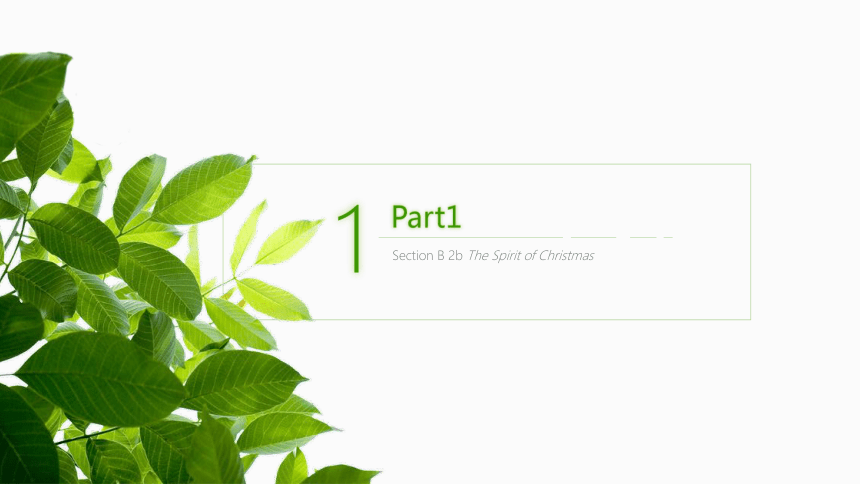
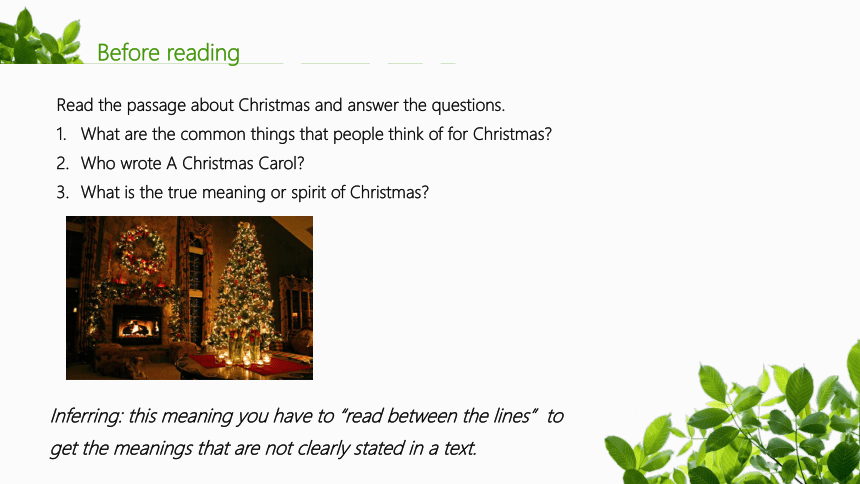
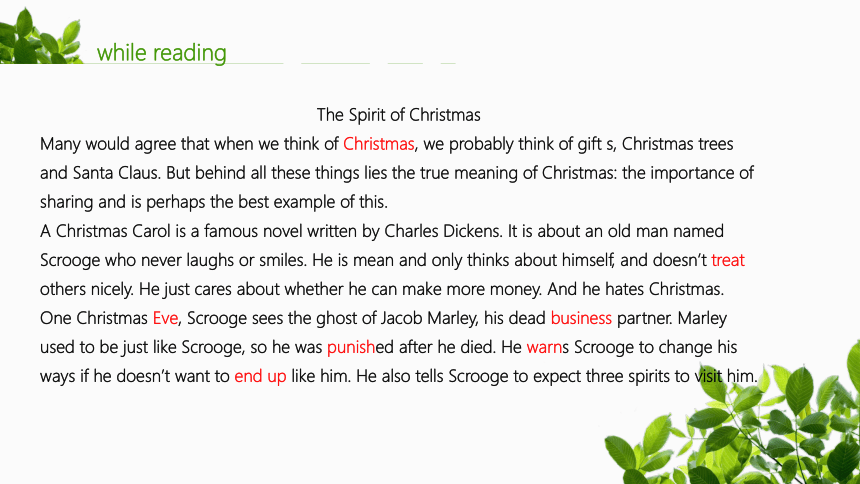
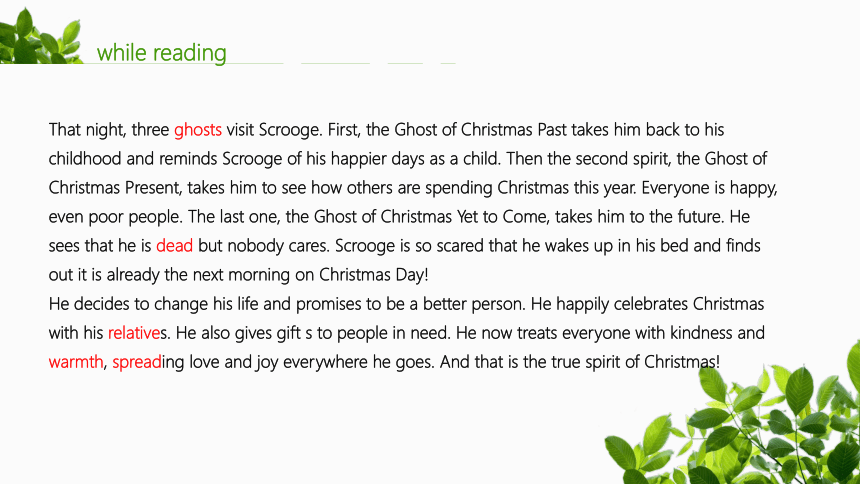
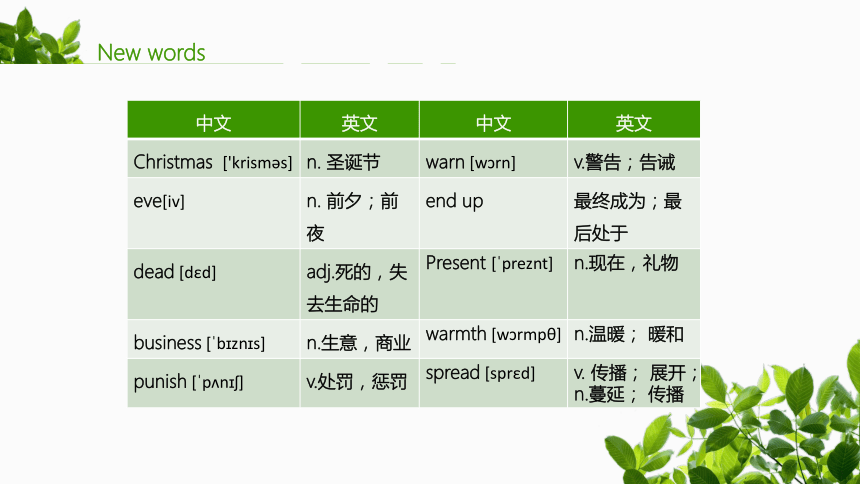
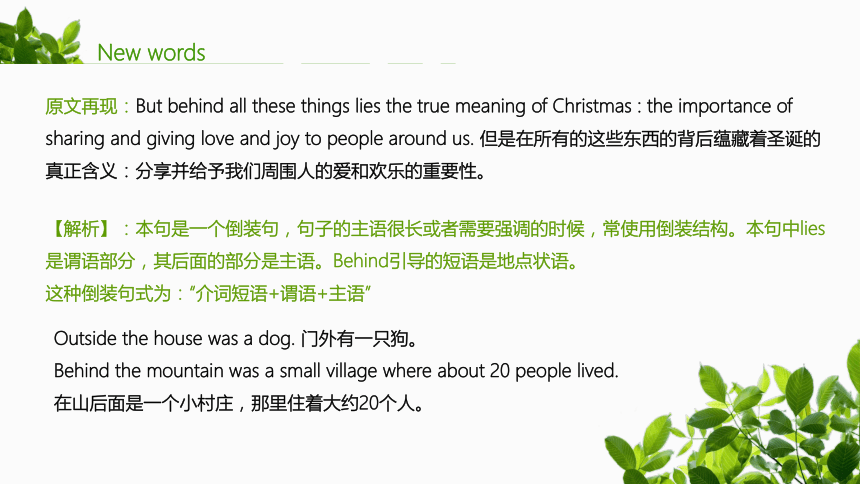
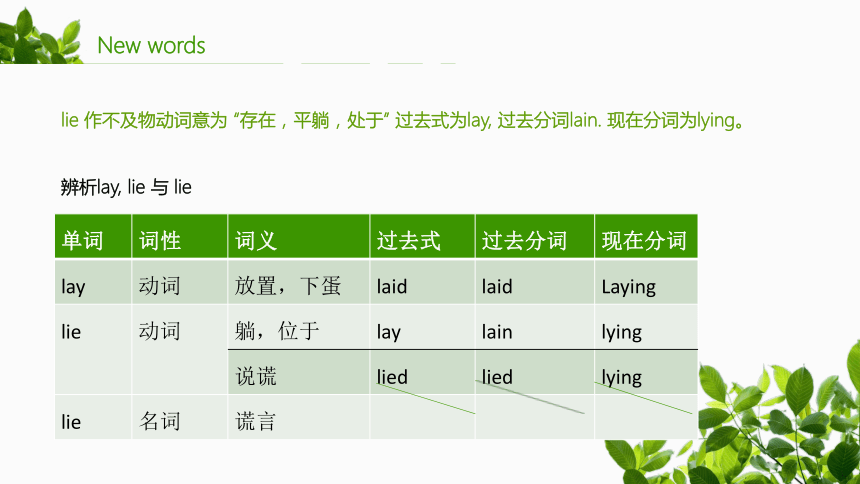
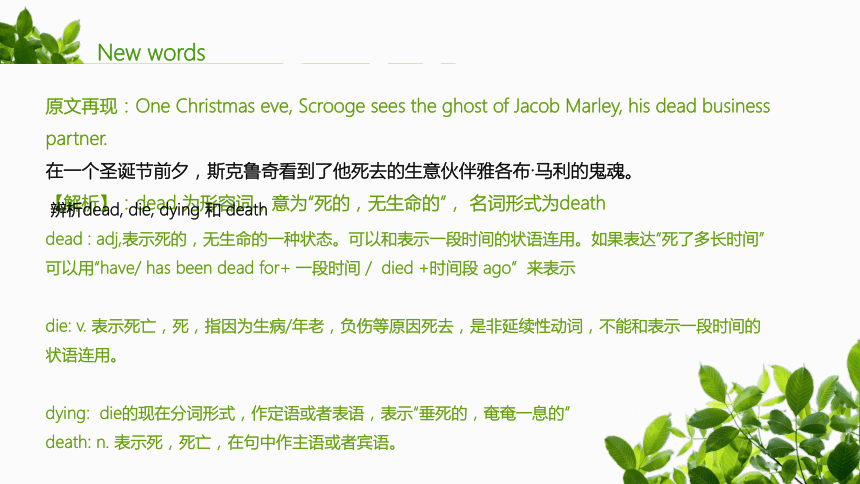
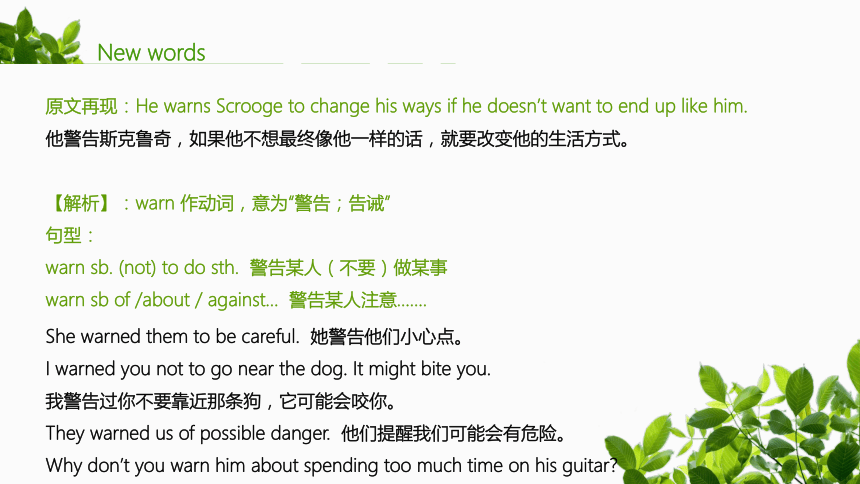

文档简介
(共46张PPT)
I
think
that
mooncakes
are
delicious
目录
Content
又是一年蝉鸣时
Part1
Section
B
2b
The
Spirit
of
Christmas
Part2
语法
:
if,
whether,
that
引导的宾语从句
Part3
补充知识
Part1
Section
B
2b
The
Spirit
of
Christmas
1
Before
reading
Inferring:
this
meaning
you
have
to
“read
between
the
lines”
to
get
the
meanings
that
are
not
clearly
stated
in
a
text.
Read
the
passage
about
Christmas
and
answer
the
questions.
What
are
the
common
things
that
people
think
of
for
Christmas?
Who
wrote
A
Christmas
Carol?
What
is
the
true
meaning
or
spirit
of
Christmas?
while
reading
The
Spirit
of
Christmas
Many
would
agree
that
when
we
think
of
Christmas,
we
probably
think
of
gift
s,
Christmas
trees
and
Santa
Claus.
But
behind
all
these
things
lies
the
true
meaning
of
Christmas:
the
importance
of
sharing
and
is
perhaps
the
best
example
of
this.
A
Christmas
Carol
is
a
famous
novel
written
by
Charles
Dickens.
It
is
about
an
old
man
named
Scrooge
who
never
laughs
or
smiles.
He
is
mean
and
only
thinks
about
himself,
and
doesn’t
treat
others
nicely.
He
just
cares
about
whether
he
can
make
more
money.
And
he
hates
Christmas.
One
Christmas
Eve,
Scrooge
sees
the
ghost
of
Jacob
Marley,
his
dead
business
partner.
Marley
used
to
be
just
like
Scrooge,
so
he
was
punished
after
he
died.
He
warns
Scrooge
to
change
his
ways
if
he
doesn’t
want
to
end
up
like
him.
He
also
tells
Scrooge
to
expect
three
spirits
to
visit
him.
That
night,
three
ghosts
visit
Scrooge.
First,
the
Ghost
of
Christmas
Past
takes
him
back
to
his
childhood
and
reminds
Scrooge
of
his
happier
days
as
a
child.
Then
the
second
spirit,
the
Ghost
of
Christmas
Present,
takes
him
to
see
how
others
are
spending
Christmas
this
year.
Everyone
is
happy,
even
poor
people.
The
last
one,
the
Ghost
of
Christmas
Yet
to
Come,
takes
him
to
the
future.
He
sees
that
he
is
dead
but
nobody
cares.
Scrooge
is
so
scared
that
he
wakes
up
in
his
bed
and
finds
out
it
is
already
the
next
morning
on
Christmas
Day!
He
decides
to
change
his
life
and
promises
to
be
a
better
person.
He
happily
celebrates
Christmas
with
his
relatives.
He
also
gives
gift
s
to
people
in
need.
He
now
treats
everyone
with
kindness
and
warmth,
spreading
love
and
joy
everywhere
he
goes.
And
that
is
the
true
spirit
of
Christmas!
while
reading
New
words
中文
英文
中文
英文
Christmas
?['krism?s]
n.
圣诞节
warn?[w?rn]?
v.警告;告诫
eve[iv]
n.
前夕;前夜
end
up
最终成为;最后处于
dead?[dεd]
adj.死的,失去生命的
Present
[?preznt]?
n.现在,礼物
business?[?b?zn?s]?
n.生意,商业
warmth?[w?rmpθ]
n.温暖;
暖和
punish?[?p?n??]
v.处罚,惩罚
spread?[sprεd]?
v.
传播;
展开;n.蔓延;
传播
New
words
原文再现:But
behind
all
these
things
lies
the
true
meaning
of
Christmas
:
the
importance
of
sharing
and
giving
love
and
joy
to
people
around
us.
但是在所有的这些东西的背后蕴藏着圣诞的真正含义:分享并给予我们周围人的爱和欢乐的重要性。
【解析】:本句是一个倒装句,句子的主语很长或者需要强调的时候,常使用倒装结构。本句中lies是谓语部分,其后面的部分是主语。Behind引导的短语是地点状语。
这种倒装句式为:“介词短语+谓语+主语”
Outside
the
house
was
a
dog.
门外有一只狗。
Behind
the
mountain
was
a
small
village
where
about
20
people
lived.
在山后面是一个小村庄,那里住着大约20个人。
New
words
辨析lay,
lie
与
lie
单词
词性
词义
过去式
过去分词
现在分词
lay
动词
放置,下蛋
laid
laid
Laying
lie
动词
躺,位于
lay
lain
lying
说谎
lied
lied
lying
lie
名词
谎言
lie
作不及物动词意为
“存在,平躺,处于”
过去式为lay,
过去分词lain.
现在分词为lying。
New
words
原文再现:One
Christmas
eve,
Scrooge
sees
the
ghost
of
Jacob
Marley,
his
dead
business
partner.
在一个圣诞节前夕,斯克鲁奇看到了他死去的生意伙伴雅各布·马利的鬼魂。
【解析】:dead
为形容词,意为“死的,无生命的”,
名词形式为death
辨析dead,
die,
dying
和
death
dead
:
adj,表示死的,无生命的一种状态。可以和表示一段时间的状语连用。如果表达“死了多长时间”
可以用“have/
has
been
dead
for+
一段时间
/
died
+时间段
ago”
来表示
die:
v.
表示死亡,死,指因为生病/年老,负伤等原因死去,是非延续性动词,不能和表示一段时间的状语连用。
dying:
die的现在分词形式,作定语或者表语,表示“垂死的,奄奄一息的”
death:
n.
表示死,死亡,在句中作主语或者宾语。
New
words
原文再现:He
warns
Scrooge
to
change
his
ways
if
he
doesn’t
want
to
end
up
like
him.
他警告斯克鲁奇,如果他不想最终像他一样的话,就要改变他的生活方式。
【解析】:warn
作动词,意为“警告;告诫”
句型:
warn
sb.
(not)
to
do
sth.
警告某人(不要)做某事
warn
sb
of
/about
/
against…
警告某人注意…….
She
warned
them
to
be
careful.
她警告他们小心点。
I
warned
you
not
to
go
near
the
dog.
It
might
bite
you.
我警告过你不要靠近那条狗,它可能会咬你。
They
warned
us
of
possible
danger.
他们提醒我们可能会有危险。
Why
don’t
you
warn
him
about
spending
too
much
time
on
his
guitar?
New
words
end
up
“最终成为;最后处于”
,后常跟形容词,介词短语或动名词(短语)
If
he
keeps
driving
like
that,
he’ll
end
up
with
dead.
如果他继续那样开车,总有一天会把命丢掉。
I
ended
up
doing
all
the
work
myself.
结果所有的活儿都是我一个人干了。
【搭配】:end
up
as
最后成为……
end
up
like
最后像……一样
end
up
with以……
结束
(反义:begin
with…
以…..开始)
He
worked
very
hard
and
ended
up
as
a
famous
scientist.
他非常努力,
最终成为一位著名的科学家。
Try
to
keep
healthy.
I
don’t
want
you
to
end
up
like
that.
努力保持健康,我不想你最后变成那样。
New
words
原文再现:
Then
the
second
spirit,
the
Ghost
of
Christmas
Present,
takes
him
to
see
how
others
are
spending
Christmas
this
year.
然后第二个幽灵,“现在之灵”带她去看别人是如何度过今年的圣诞节的。
present
不可数名词,意为“目前,现在”,常用短语at
present
You
can’t
live
in
the
past;
just
think
about
the
present.
你不能活在过去,想想现在。
At
present,
everything
goes
well.
目前一切都好。
present
作形容词
意为“现在的;目前的”,只用于名词前。
What
do
you
think
of
your
present
company,
David?
大卫,你觉得现在的公司怎么样?
New
words
present
作形容词,意为“出席的,到场的”,修饰名词时后置。
The
quests
present
were
all
in
high
spirits.
到场的客个个兴致很高。
present
作可数名词,意为“礼物,赠品”
My
uncle
sent
me
an
iPad
as
a
birthday
present.
我伯伯送我一部iPad作为生日礼物。
辨析present和gift
两者都表示“礼物”,两者主要区别在于:
gift比present更为正式,可指价值较小或相当大的礼物;present通常指花费不大的礼物。
送礼,英文中可以表述为“give
a
present”,“present
a
gift”
或“
send
a
present/
gift”
New
words
原文再现:
Not
only
do
people
spread
them
around
in
different
hiding
places
for
an
egg
hunt
,but
they
also
give
out
these
treats
as
gifts.
人们不仅为了玩寻找复活节鸡蛋的游戏而将鸡蛋分散到周围不同的隐藏处,而且他们还把这些好吃的作为礼物分发给别人。
Not
only…but
also…
意为“不仅……而且……”,其中also可以省略,用于连接两个相同的句子成分。
句中Not
only
do
people
…
an
egg
hunt
是一个倒装句,否定词not
only放在句首为了表示强调。在英语中,为了强调某些内容,常把一些否定词放在句首,此时句子用倒装。例如:never,
little,
hardly
Never
have
I
heard
such
a
name.
我从未听说过这样一个名字。
注意:
not
only…but
also…
连接两个主语的时候,要用就近原则
Not
only
you
but
also
she
is
an
English
teacher.
Practice
1.___________,
blogs
are
much
more
popular
than
traditional
diaries
among
young
people.
Just
now
B.
So
far
C.
At
present
D.
Right
away
2.
The
mobile
phone
was
a__________
from
my
grandfather.
present
B.
number
C.
symbol
D.
relative
3.
The
boats
are
different
routes,
but
they
all
________
in
the
same
place.
A.
give
up
B.
clear
up
C.
end
up
D.
make
up
C
A
C
Practice
4.
I
found
a
letter_________
on
the
floor
when
I
came
into
the
classroom.
lying
B.
lay
C.
lie
D.
lies
5.
William
Shakespeare
________
for
400
years,
but
his
works
still
have
great
influence
today.
died
B.
was
dying
C.
has
died
D.
has
been
dead
6.
—Which
film
do
you
like
best?
—
The
Martian.
It
_______
shows
a
lot
of
imagination,________
has
a
sense
of
humor,
A.
too;
to
B.
neither;
nor
C.
either;
or
D.
not
only;
but
also
A
D
D
Part2
语法:
if,
whether,
that
引导的宾语从句
2
Grammar
that
和
if/
whether
引导的宾语从句
宾语从句:
在句子中充当宾语作用的句子。
主句和从句之间有一个引导词。
I
know
her.
She
is
a
friend
of
Alex.
我知道她。她是艾利克斯的一个朋友。
宾语
I
know
that
she
is
friend
of
a
Alex.
我知道她是艾利克斯的一个朋友。
宾语从句
“
Does
he
like
it?
”
she
asks.
宾语
She
asks
if/
whether
he
like
it.
宾语从句
Grammar
1.宾语从句引导词
宾语从句由陈述句变化而来的时候,用that
引导从句,
that无具体意义,一般可以省略。
I
know
(that)
she
is
going
to
give
me
a
present.
我知道她准备给我一个礼物。
I
think
(that)
you
should
go
to
bed
early.
我认为你应该早点睡觉。
2)宾语从句由一般疑问句变化而来的时候,可用if或whether来引导从句,意为“是否”。
“Did
you
sleep
well”
David
asked
her.
→David
asked
her
if/
whether
she
slept
well.
Grammar
3)宾语从句由特殊疑问句变化而来的时候,原句中的疑问词充当连接代词(who/whose/what/which)或连接副词(when/where/why/how)来引导宾语从句
Where
can
we
stay
on
this
island?
Do
you
know
it?
→Do
you
know
where
we
can
stay
on
this
island.
“When
is
her
birthday?
“
Tim
thought.
→Tim
thought
when
her
birthday
is.
“How
do
you
usually
get
to
school
?
“
The
teacher
asks.
→The
teacher
asks
how
you
usually
get
to
school.
Grammar
2.宾语从句的语序
宾语从句一律用陈述句语序,“引导词+主语+谓语+其他”
He
is
an
honest
boy.
The
teacher
say.
→
The
teacher
says
(that)
he
is
an
honest
boy.
Does
he
work
hard?
I
wonder.
→
I
wonder
if
/
whether
he
works
hard.
When
did
he
leave?
I
don’t
know.
→
I
don’t
know
when
he
left.
Why
did
you
stay
up
so
late?
My
mum
complains.
→
My
mum
complains
why
I
stayed
up
so
late.
Grammar
3.宾语从句的时态
1)That
引导的宾语从句,如果主句用一般现在时,从句可以根据情况使用任意时态。
She
says
(that)
they
have
returned
already.
她说她们已经回来了。
He
tells
me
that
he
was
born
in
1985.他告诉我他出生于1985年。
2)主句用一般过去时,从句要用过去时态的某种形式(一般过去时,过去进行时,过去将来时,过去完成时)
He
said
(that)
he
bought
a
new
book.
他说他买了一本新书。
I
knew
they
were
studying
English.
我知道他们正在学习英语。
3)若从句表达客观事实,整理,自然现象,名言警句,格言谚语等。从句时态不受主句影响,用一般现在时。
He
said
time
is
life.
他说时间就是生命。
My
mom
told
me
that
east
or
west,
home
is
the
best.
我妈妈告诉我金窝银窝不如自己的狗窝。
Grammar
4.
引导词that的省略情况
1)可省略的情况:
that引导宾语从句,只起连接主,从句的作用,本身无意义,
在口语或非正式文体中常被省略。
He
says
(that)
he
is
a
Young
Pioneer.
他说他是一名少先队员。
2)不可省略的情况:
①that
引导的宾语从句在句中作介词宾语时,that不可以省略。
I
know
nothing
about
him
except
that
he
is
from
the
south.
We
often
talk
about
that
we
should
do
something
to
help
the
poor.
②that
引导复合句时,不可省略。
I
think
that
if
you
have
lost
the
library
book,
you
must
pay
for
it.
Grammar
③主语和从句之间有插入语的时候,that不能省略。
It
says
here,
in
the
newspaper,
that
Chinese
is
getting
more
and
more
important.
报纸上写着,汉语变得越来越重要。
④有多个that引导从句时,
第二个that
不可省略。
He
said
(that)he
had
finished
reading
this
novel
and
that
he
would
borrow
another
one.
他说他已经读完了这本小说,想再借一本。
Grammar
5.引导词if
和whether的区别
1)
两者都能引导宾语从句,一般情况可以互换。If在口语和非正式文体中出现较多,whether多用于比较正式文体中。
He
asked
me
if
/whether
I
could
help
him
with
his
English.
2)只用whether
不用if
的情况。
①和or
not搭配的时候,只用whether
不用if
I
don’t
know
whether
or
nor
he
will
come.
②当宾语从句放在句首表示强调的时候
Whether
he
will
come
I
am
not
sure.
③宾语从句作介词的宾语时
It
depends
on
whether
it
will
be
fine.
④宾语从句作discuss等动词的宾语时
we
discussed
whether
we
should
close
the
shop.
⑤句中有if引导得条件状语从句,若再有表示“是否”的宾语从句时
He
asked
me
whether
I
would
move
to
New
York
if
I
got
the
job.
⑥动词不定式之前
I
don’t
know
whether
to
go
there
at
once.
Grammar
注意:宾语从句表示否定意义时,如果主句主语为第一人称,谓语动词是think
,believe
,guess
,
suppose
等词的时候,
通常将否定转移至主句的谓语动词之前。
I
don’t
believe
he
will
come.
我相信他不会再来了。
宾语从句用法口诀:
宾语从句需注意,几个事项应牢记。
一是关键引导词,不同句子词相异
陈述句用that,
一般疑问“是否”(if
,
whether)替
二是时态常变化,主句不同从句异
主语若为现在时,从句时态可随意
主句若为过去时,
从句时态向后移
三是语序要记清,从句永保陈述序
Practice
1.I
wonder
_____
John
will
appear,
but
I’m
sure
he’ll
attend
the
party_____
he
is
free.
if;
whether
B.
whether;
if
C
.
if;
weather
D.
weather;
if
2.—let’s
go
to
the
community
if
it
_______
tomorrow.
—But
nobody
knows
if
it
_______
tomorrow.
won’t
wain;
rains
B.
doesn’t
rain;
rains
C.
doesn’t
rain;
will
rain
D.
won’t
rain;
will
rain
3.
Our
teacher
said
sound______
much
more
slowly
than
light.
A.
traveled
B.
was
traveling
C.
has
traveled
D.
travels
B
C
D
Practice
4.—I
wonder
____________.
--She
is
under
much
pressure
at
work
these
days.
A.
whether
Linda
will
give
up
B.
how
are
things
with
Linda
C.
Why
Linda
has
been
acting
so
strangely
D.
when
will
she
come
to
the
office
5.---What
did
Mr.
Green
say
just
now?
---
He
asked
us
_______.
A.
when
was
I
born
B.
who
had
an
iPad
in
hand
C.
if
we
are
interested
in
making
a
pen
pal
D.
that
we
must
finish
our
task
on
time
B
C
6.—Did
the
kids
like
the
presents?
—You
can't
imagine
_______
when
they
received
those
nice
presents.
A.
how
they
were
excited
B.
how
excited
they
were
C.
how
excited
were
they
D.
they
were
how
excited
7.
--I’d
like
to
know
________.
--I’m
not
sure.
Maybe
at
seven.
A.
whether
will
Emma
attend
the
party
B.
how
Emma
prepared
for
the
party
C.
when
is
Emma
coming
to
the
party
D.
what
time
Emma
will
appear
at
the
party
B
D
Practice
Part3
补充内容
3
New
words
课文原句:Bill
thinks
that
the
races
were
not
that
interesting
to
watch.比尔认为观看这些比赛并没有那么有趣。
【解析】
sth
+
be+形容词+
to
do
意为“做……是……的”
该句型中形容词用来修饰主语sth.
,
sth为后面不定式逻辑主语。通常该句型和it’s
+形容词+
to
do
sth.
互换。
This
question
is
hard
to
answer.=
It’s
hard
to
answer
this
question.
这个问题很难回答。
拓展:“sb
+
be
+形容词+
to
do
sth.”
表示“某人做某事是……的”
动词不定式表示原因。
He
is
happy
to
get
a
toy
car.
他很开心得到一辆玩具汽车。
New
words
课文原句:
Bill
wonders
whether
they’ll
have
zongzi
again
next
year.
比尔想知道明年他们是否还会吃粽子。
【解析】Wonder
在此用作及物动词,意为“想知道”,相当于
want
to
know.
wonder
在不同的句式中表达的意思也不同。
后接who,
what
,why,
how等连接词引导的宾语从句及“疑问词+动词不定式”结构时,意为“想知道”
I
wonder
who
that
boy
is.
我想知道那个男孩是谁。
2.后接if
或whether
引导的宾语从句时,
表示一种委婉的请求或疑问。
I
wonder
if
I
could
use
your
mobile
phone.
3.后接that引导得宾语从句及“at/about
+
sth.”
时,表示“(对……)感到惊讶”。
I
wonder
that
she
is
so
cheerful.
我很惊讶地发现她看上去那么高兴。
Sometimes
I
wonder
about
his
behavior.
有时我对她的行为感到惊讶。
New
words
wonder
作为名词用的时候,有“奇迹,奇观”的意思。
What
are
the
Seven
Wonders
in
the
world?
世界“七大奇迹”是什么?
wonderful
形容词,意为“壮观的,奇妙的,精彩的”
We
had
a
wonderful
time
in
the
park
last
Sunday.
I
l
think
the
singer
of
Wonderful
you
is
really
cool.
New
words
put
on
意为
“增加(体重);发胖”
He
has
put
on
weight
during
the
last
two
months.
他上两个月里体重增加了。
The
rise
of
meat
prices
will
put
pounds
on
the
cost
of
living.肉类价格的升高将使生活成本增加。
put
on
穿上,戴上,把…..放在……上,
打开(煤气,电灯,收音机等)
课本原句:I’ve
put
on
five
pounds!
我的体重增加了5磅!
put
相关的短语
put
away
收起来
put
down
放下,记下来,写下来
put
up
举起,张贴
put
off,
延期;
拖延
put
out
熄灭;
扑灭
New
words
拓展:
dress
sb.
给某人穿衣服
be/
get
dressed
穿着……的衣服
dress
up
as…
打扮成……
dress
up
in…
穿上……的衣服或……颜色的衣服
dress
up
穿上盛装;
装扮
She
always
dresses
her
baby.
她总是给她的宝贝穿衣服。
The
old
man
can’t
wash
or
get
dressed
herself.
这个老人无法自己洗脸穿衣。
She
was
dressed
in
red.
她穿着红色的衣服。
She
is
going
to
dress
up
as
Snow
White.
她打算打扮成白雪公主。
The
boy
likes
dressing
up
is
black.
这个男孩喜欢穿黑色的衣服。
New
words
Pick
up
捡起
grow
up
长大
stay
up
熬夜
Look
up
查阅
put
up
张贴,举起
give
up放弃
Use
up
用完
turn
up
调高
take
up
开始从事,
占用
break
up
结束,破碎
come
up
发生,上来
bring
up
养育,提到,呕出
up
短语归纳:
New
words
trick,
可数名词,意为“诡计;花招;骗局”
He
said
he
had
a
stomachache;
actually,
it
was
just
a
trick.
他说他肚子疼,实际上,这是一个轨迹。
trick,
可意为
“恶作剧,闹剧”
Play
a
trick
on
sb.
耍恶作剧,
捉弄某人
=
play
a
joke
on
sb.
=
make
fun
of
sb.
Don’t
play
a
trick
on
your
classmates.
不要捉弄你的同学。
trick
or
treat
不给糖就捣乱
New
words
trick
or
treat
不给糖就捣乱
treat
在此处用作可数名词,意为“请客,款待”
This
is
my
treat.
这次由我请客。
treat
还可以用作及物动词。
意为“款待,请客”,
常有短语:
treat
sb.
to
sth.
意为“请某人吃……”
She
treats
us
to
some
delicious
chicken.
她请我们吃美味的鸡肉。
2.意为”看待,当作”,与as
连用构成短语“treat…as…”
意为
“把……当作……”
Don’t
treat
me
as
a
child.
不要把我当作小孩。
Which
doctor
are
treating
him
for
his
illness?
哪几位医生在为他治疗?
Practice
1.—Oh,
my
god!I
______
2kg
this
month.
—
Don’t
worry.
It’s
normal
for
a
growing
teenage
girl.
put
up
B.
put
off
C
.
put
on
D.
put
down
2.—
I
wonder
_____
John
will
appear,
but
I’m
sure
he’ll
attend
the
party
____he
is
free.
—
Maybe,
but
I
don’t
think
so.
A.
if;
whether
B.
whether;
if
C.
if;
weather
D.
weather;
if
3.
—Let’s
go
to
the
community
if
it_______
tomorrow.
—But
nobody
knows
if
it______
tomorrow
A.
won’t
rain;
rains
B.
doesn’t
rain;
rains
C.
doesn’t
rain;
will
rain
D.
won’t
rain;
will
rain
C
B
C
Practice
4.—Don’t
______
too
late;
you
will
feel
tired
in
class
.
—
I
won’t
,Mum.
put
up
B.
call
up
C
.
Stay
up
D.
get
up
5.
If
you
go
there
,
he
will
give
you
a_______.
I
think
he
can
_______
you
in
a
friendly
way.
A.
treat;
treat
B.
trick;
trick
C.
treat;
trick
D.
trick;
treat
6.
When
I
was
young,
I
was
naughty.
I
often
played_______
on
the
people
ground.
—But
nobody
knows
if
it______
tomorrow
A.
treats
B.
cards
C.
tricks
D.
hidings
C
A
C
Practice
1.I
wonder
if
he
has
passed
the
exam.
I
_________
_________
__________
if
he
has
passed
the
exam.
2.How
_____________
(wonder)
the
movie
is!
3.It
is
not
easy
to
learn
English.
English
is
not
that
easy
_________
__________.
4.”Did
Tom
play
soccer
yesterday?”
Jack
wonders
(改同义句)
Jack
wonders_____________
Tom
___________soccer
yesterday.
want
wonderful
to
to
know
learn
if/whether
played
1.—Where
are
our
notebooks?
I
saw
them
_______on
the
table
a
minute
ago.
--Toby
said
he
didn’t
take
them.
But
I
think
he
______
to
us.
A.
laying;
lied
B.
laid;
lies
C.
lying;
lied
D.
lied;
lies
2.
When
you
are
done
with
the
book,
just
give
it
to
Asia
or
Emily
or__________.
----Okay,
I
will.
A.
whenever
B.
whatever
C.
however
D.
whoever
3.—Before
daybreak,
Lisa
always
dresses
up
quietly
and_______
out
of
the
house
so
as
not
to
wake
her
family.
A.
puts
B.
steals
C.
jumps
D.
climbs
Quiz
C
D
C
4.—Do
you
mind
if
I
____
some
nice
music?
--You’d
better
not.
I
believe
all
our
neighbors
have
gone
to
bed
now.
A.
bring
out
B.
take
on
C.
try
out
D.
put
on
5.
---I'm
afraid
I
can't
join
the
army
because
of
my
poor
eyesight.
---But
as
far
as
I
know,
some
eyesight
problems
are
easy
to
_____
now.
A.
receive
B.
spread
C.
correct
D.
increase
6.---Thank
you
for
giving
me
a
ride
to
the
market.
---______.
I'm
just
going
in
the
same
direction.
A.
With
pleasure
B.
None
of
your
business
C.
I
don't
think
so
D.
Think
nothing
of
it
Quiz
D
C
D
Quiz
7.Could
you
explain______?
That’s
simple.
Just
mix
some
tomatoes
and
eggs
together.
A.
what
is
the
bowl
used
for
B.
why
you
will
cook
such
a
good
meal
C.
when
will
the
dinner
be
ready
D.
how
the
soup
was
made
8.—Do
you
mind
if
I
______
some
nice
music?
--You’d
better
not.
I
believe
all
our
neighbors
have
gone
to
bed
now.
bring
out
B.
take
on
C.
try
out
D.
put
on
9.
---Do
you
know______?
---Sorry
I
have
no
idea.
A.
what
happened
to
Matt
B.
what
the
matter
is
with
Matt
C.
how
is
Matt
today
D.
what
wrong
is
with
Matt
D
D
A
Thanks
I
think
that
mooncakes
are
delicious
目录
Content
又是一年蝉鸣时
Part1
Section
B
2b
The
Spirit
of
Christmas
Part2
语法
:
if,
whether,
that
引导的宾语从句
Part3
补充知识
Part1
Section
B
2b
The
Spirit
of
Christmas
1
Before
reading
Inferring:
this
meaning
you
have
to
“read
between
the
lines”
to
get
the
meanings
that
are
not
clearly
stated
in
a
text.
Read
the
passage
about
Christmas
and
answer
the
questions.
What
are
the
common
things
that
people
think
of
for
Christmas?
Who
wrote
A
Christmas
Carol?
What
is
the
true
meaning
or
spirit
of
Christmas?
while
reading
The
Spirit
of
Christmas
Many
would
agree
that
when
we
think
of
Christmas,
we
probably
think
of
gift
s,
Christmas
trees
and
Santa
Claus.
But
behind
all
these
things
lies
the
true
meaning
of
Christmas:
the
importance
of
sharing
and
is
perhaps
the
best
example
of
this.
A
Christmas
Carol
is
a
famous
novel
written
by
Charles
Dickens.
It
is
about
an
old
man
named
Scrooge
who
never
laughs
or
smiles.
He
is
mean
and
only
thinks
about
himself,
and
doesn’t
treat
others
nicely.
He
just
cares
about
whether
he
can
make
more
money.
And
he
hates
Christmas.
One
Christmas
Eve,
Scrooge
sees
the
ghost
of
Jacob
Marley,
his
dead
business
partner.
Marley
used
to
be
just
like
Scrooge,
so
he
was
punished
after
he
died.
He
warns
Scrooge
to
change
his
ways
if
he
doesn’t
want
to
end
up
like
him.
He
also
tells
Scrooge
to
expect
three
spirits
to
visit
him.
That
night,
three
ghosts
visit
Scrooge.
First,
the
Ghost
of
Christmas
Past
takes
him
back
to
his
childhood
and
reminds
Scrooge
of
his
happier
days
as
a
child.
Then
the
second
spirit,
the
Ghost
of
Christmas
Present,
takes
him
to
see
how
others
are
spending
Christmas
this
year.
Everyone
is
happy,
even
poor
people.
The
last
one,
the
Ghost
of
Christmas
Yet
to
Come,
takes
him
to
the
future.
He
sees
that
he
is
dead
but
nobody
cares.
Scrooge
is
so
scared
that
he
wakes
up
in
his
bed
and
finds
out
it
is
already
the
next
morning
on
Christmas
Day!
He
decides
to
change
his
life
and
promises
to
be
a
better
person.
He
happily
celebrates
Christmas
with
his
relatives.
He
also
gives
gift
s
to
people
in
need.
He
now
treats
everyone
with
kindness
and
warmth,
spreading
love
and
joy
everywhere
he
goes.
And
that
is
the
true
spirit
of
Christmas!
while
reading
New
words
中文
英文
中文
英文
Christmas
?['krism?s]
n.
圣诞节
warn?[w?rn]?
v.警告;告诫
eve[iv]
n.
前夕;前夜
end
up
最终成为;最后处于
dead?[dεd]
adj.死的,失去生命的
Present
[?preznt]?
n.现在,礼物
business?[?b?zn?s]?
n.生意,商业
warmth?[w?rmpθ]
n.温暖;
暖和
punish?[?p?n??]
v.处罚,惩罚
spread?[sprεd]?
v.
传播;
展开;n.蔓延;
传播
New
words
原文再现:But
behind
all
these
things
lies
the
true
meaning
of
Christmas
:
the
importance
of
sharing
and
giving
love
and
joy
to
people
around
us.
但是在所有的这些东西的背后蕴藏着圣诞的真正含义:分享并给予我们周围人的爱和欢乐的重要性。
【解析】:本句是一个倒装句,句子的主语很长或者需要强调的时候,常使用倒装结构。本句中lies是谓语部分,其后面的部分是主语。Behind引导的短语是地点状语。
这种倒装句式为:“介词短语+谓语+主语”
Outside
the
house
was
a
dog.
门外有一只狗。
Behind
the
mountain
was
a
small
village
where
about
20
people
lived.
在山后面是一个小村庄,那里住着大约20个人。
New
words
辨析lay,
lie
与
lie
单词
词性
词义
过去式
过去分词
现在分词
lay
动词
放置,下蛋
laid
laid
Laying
lie
动词
躺,位于
lay
lain
lying
说谎
lied
lied
lying
lie
名词
谎言
lie
作不及物动词意为
“存在,平躺,处于”
过去式为lay,
过去分词lain.
现在分词为lying。
New
words
原文再现:One
Christmas
eve,
Scrooge
sees
the
ghost
of
Jacob
Marley,
his
dead
business
partner.
在一个圣诞节前夕,斯克鲁奇看到了他死去的生意伙伴雅各布·马利的鬼魂。
【解析】:dead
为形容词,意为“死的,无生命的”,
名词形式为death
辨析dead,
die,
dying
和
death
dead
:
adj,表示死的,无生命的一种状态。可以和表示一段时间的状语连用。如果表达“死了多长时间”
可以用“have/
has
been
dead
for+
一段时间
/
died
+时间段
ago”
来表示
die:
v.
表示死亡,死,指因为生病/年老,负伤等原因死去,是非延续性动词,不能和表示一段时间的状语连用。
dying:
die的现在分词形式,作定语或者表语,表示“垂死的,奄奄一息的”
death:
n.
表示死,死亡,在句中作主语或者宾语。
New
words
原文再现:He
warns
Scrooge
to
change
his
ways
if
he
doesn’t
want
to
end
up
like
him.
他警告斯克鲁奇,如果他不想最终像他一样的话,就要改变他的生活方式。
【解析】:warn
作动词,意为“警告;告诫”
句型:
warn
sb.
(not)
to
do
sth.
警告某人(不要)做某事
warn
sb
of
/about
/
against…
警告某人注意…….
She
warned
them
to
be
careful.
她警告他们小心点。
I
warned
you
not
to
go
near
the
dog.
It
might
bite
you.
我警告过你不要靠近那条狗,它可能会咬你。
They
warned
us
of
possible
danger.
他们提醒我们可能会有危险。
Why
don’t
you
warn
him
about
spending
too
much
time
on
his
guitar?
New
words
end
up
“最终成为;最后处于”
,后常跟形容词,介词短语或动名词(短语)
If
he
keeps
driving
like
that,
he’ll
end
up
with
dead.
如果他继续那样开车,总有一天会把命丢掉。
I
ended
up
doing
all
the
work
myself.
结果所有的活儿都是我一个人干了。
【搭配】:end
up
as
最后成为……
end
up
like
最后像……一样
end
up
with以……
结束
(反义:begin
with…
以…..开始)
He
worked
very
hard
and
ended
up
as
a
famous
scientist.
他非常努力,
最终成为一位著名的科学家。
Try
to
keep
healthy.
I
don’t
want
you
to
end
up
like
that.
努力保持健康,我不想你最后变成那样。
New
words
原文再现:
Then
the
second
spirit,
the
Ghost
of
Christmas
Present,
takes
him
to
see
how
others
are
spending
Christmas
this
year.
然后第二个幽灵,“现在之灵”带她去看别人是如何度过今年的圣诞节的。
present
不可数名词,意为“目前,现在”,常用短语at
present
You
can’t
live
in
the
past;
just
think
about
the
present.
你不能活在过去,想想现在。
At
present,
everything
goes
well.
目前一切都好。
present
作形容词
意为“现在的;目前的”,只用于名词前。
What
do
you
think
of
your
present
company,
David?
大卫,你觉得现在的公司怎么样?
New
words
present
作形容词,意为“出席的,到场的”,修饰名词时后置。
The
quests
present
were
all
in
high
spirits.
到场的客个个兴致很高。
present
作可数名词,意为“礼物,赠品”
My
uncle
sent
me
an
iPad
as
a
birthday
present.
我伯伯送我一部iPad作为生日礼物。
辨析present和gift
两者都表示“礼物”,两者主要区别在于:
gift比present更为正式,可指价值较小或相当大的礼物;present通常指花费不大的礼物。
送礼,英文中可以表述为“give
a
present”,“present
a
gift”
或“
send
a
present/
gift”
New
words
原文再现:
Not
only
do
people
spread
them
around
in
different
hiding
places
for
an
egg
hunt
,but
they
also
give
out
these
treats
as
gifts.
人们不仅为了玩寻找复活节鸡蛋的游戏而将鸡蛋分散到周围不同的隐藏处,而且他们还把这些好吃的作为礼物分发给别人。
Not
only…but
also…
意为“不仅……而且……”,其中also可以省略,用于连接两个相同的句子成分。
句中Not
only
do
people
…
an
egg
hunt
是一个倒装句,否定词not
only放在句首为了表示强调。在英语中,为了强调某些内容,常把一些否定词放在句首,此时句子用倒装。例如:never,
little,
hardly
Never
have
I
heard
such
a
name.
我从未听说过这样一个名字。
注意:
not
only…but
also…
连接两个主语的时候,要用就近原则
Not
only
you
but
also
she
is
an
English
teacher.
Practice
1.___________,
blogs
are
much
more
popular
than
traditional
diaries
among
young
people.
Just
now
B.
So
far
C.
At
present
D.
Right
away
2.
The
mobile
phone
was
a__________
from
my
grandfather.
present
B.
number
C.
symbol
D.
relative
3.
The
boats
are
different
routes,
but
they
all
________
in
the
same
place.
A.
give
up
B.
clear
up
C.
end
up
D.
make
up
C
A
C
Practice
4.
I
found
a
letter_________
on
the
floor
when
I
came
into
the
classroom.
lying
B.
lay
C.
lie
D.
lies
5.
William
Shakespeare
________
for
400
years,
but
his
works
still
have
great
influence
today.
died
B.
was
dying
C.
has
died
D.
has
been
dead
6.
—Which
film
do
you
like
best?
—
The
Martian.
It
_______
shows
a
lot
of
imagination,________
has
a
sense
of
humor,
A.
too;
to
B.
neither;
nor
C.
either;
or
D.
not
only;
but
also
A
D
D
Part2
语法:
if,
whether,
that
引导的宾语从句
2
Grammar
that
和
if/
whether
引导的宾语从句
宾语从句:
在句子中充当宾语作用的句子。
主句和从句之间有一个引导词。
I
know
her.
She
is
a
friend
of
Alex.
我知道她。她是艾利克斯的一个朋友。
宾语
I
know
that
she
is
friend
of
a
Alex.
我知道她是艾利克斯的一个朋友。
宾语从句
“
Does
he
like
it?
”
she
asks.
宾语
She
asks
if/
whether
he
like
it.
宾语从句
Grammar
1.宾语从句引导词
宾语从句由陈述句变化而来的时候,用that
引导从句,
that无具体意义,一般可以省略。
I
know
(that)
she
is
going
to
give
me
a
present.
我知道她准备给我一个礼物。
I
think
(that)
you
should
go
to
bed
early.
我认为你应该早点睡觉。
2)宾语从句由一般疑问句变化而来的时候,可用if或whether来引导从句,意为“是否”。
“Did
you
sleep
well”
David
asked
her.
→David
asked
her
if/
whether
she
slept
well.
Grammar
3)宾语从句由特殊疑问句变化而来的时候,原句中的疑问词充当连接代词(who/whose/what/which)或连接副词(when/where/why/how)来引导宾语从句
Where
can
we
stay
on
this
island?
Do
you
know
it?
→Do
you
know
where
we
can
stay
on
this
island.
“When
is
her
birthday?
“
Tim
thought.
→Tim
thought
when
her
birthday
is.
“How
do
you
usually
get
to
school
?
“
The
teacher
asks.
→The
teacher
asks
how
you
usually
get
to
school.
Grammar
2.宾语从句的语序
宾语从句一律用陈述句语序,“引导词+主语+谓语+其他”
He
is
an
honest
boy.
The
teacher
say.
→
The
teacher
says
(that)
he
is
an
honest
boy.
Does
he
work
hard?
I
wonder.
→
I
wonder
if
/
whether
he
works
hard.
When
did
he
leave?
I
don’t
know.
→
I
don’t
know
when
he
left.
Why
did
you
stay
up
so
late?
My
mum
complains.
→
My
mum
complains
why
I
stayed
up
so
late.
Grammar
3.宾语从句的时态
1)That
引导的宾语从句,如果主句用一般现在时,从句可以根据情况使用任意时态。
She
says
(that)
they
have
returned
already.
她说她们已经回来了。
He
tells
me
that
he
was
born
in
1985.他告诉我他出生于1985年。
2)主句用一般过去时,从句要用过去时态的某种形式(一般过去时,过去进行时,过去将来时,过去完成时)
He
said
(that)
he
bought
a
new
book.
他说他买了一本新书。
I
knew
they
were
studying
English.
我知道他们正在学习英语。
3)若从句表达客观事实,整理,自然现象,名言警句,格言谚语等。从句时态不受主句影响,用一般现在时。
He
said
time
is
life.
他说时间就是生命。
My
mom
told
me
that
east
or
west,
home
is
the
best.
我妈妈告诉我金窝银窝不如自己的狗窝。
Grammar
4.
引导词that的省略情况
1)可省略的情况:
that引导宾语从句,只起连接主,从句的作用,本身无意义,
在口语或非正式文体中常被省略。
He
says
(that)
he
is
a
Young
Pioneer.
他说他是一名少先队员。
2)不可省略的情况:
①that
引导的宾语从句在句中作介词宾语时,that不可以省略。
I
know
nothing
about
him
except
that
he
is
from
the
south.
We
often
talk
about
that
we
should
do
something
to
help
the
poor.
②that
引导复合句时,不可省略。
I
think
that
if
you
have
lost
the
library
book,
you
must
pay
for
it.
Grammar
③主语和从句之间有插入语的时候,that不能省略。
It
says
here,
in
the
newspaper,
that
Chinese
is
getting
more
and
more
important.
报纸上写着,汉语变得越来越重要。
④有多个that引导从句时,
第二个that
不可省略。
He
said
(that)he
had
finished
reading
this
novel
and
that
he
would
borrow
another
one.
他说他已经读完了这本小说,想再借一本。
Grammar
5.引导词if
和whether的区别
1)
两者都能引导宾语从句,一般情况可以互换。If在口语和非正式文体中出现较多,whether多用于比较正式文体中。
He
asked
me
if
/whether
I
could
help
him
with
his
English.
2)只用whether
不用if
的情况。
①和or
not搭配的时候,只用whether
不用if
I
don’t
know
whether
or
nor
he
will
come.
②当宾语从句放在句首表示强调的时候
Whether
he
will
come
I
am
not
sure.
③宾语从句作介词的宾语时
It
depends
on
whether
it
will
be
fine.
④宾语从句作discuss等动词的宾语时
we
discussed
whether
we
should
close
the
shop.
⑤句中有if引导得条件状语从句,若再有表示“是否”的宾语从句时
He
asked
me
whether
I
would
move
to
New
York
if
I
got
the
job.
⑥动词不定式之前
I
don’t
know
whether
to
go
there
at
once.
Grammar
注意:宾语从句表示否定意义时,如果主句主语为第一人称,谓语动词是think
,believe
,guess
,
suppose
等词的时候,
通常将否定转移至主句的谓语动词之前。
I
don’t
believe
he
will
come.
我相信他不会再来了。
宾语从句用法口诀:
宾语从句需注意,几个事项应牢记。
一是关键引导词,不同句子词相异
陈述句用that,
一般疑问“是否”(if
,
whether)替
二是时态常变化,主句不同从句异
主语若为现在时,从句时态可随意
主句若为过去时,
从句时态向后移
三是语序要记清,从句永保陈述序
Practice
1.I
wonder
_____
John
will
appear,
but
I’m
sure
he’ll
attend
the
party_____
he
is
free.
if;
whether
B.
whether;
if
C
.
if;
weather
D.
weather;
if
2.—let’s
go
to
the
community
if
it
_______
tomorrow.
—But
nobody
knows
if
it
_______
tomorrow.
won’t
wain;
rains
B.
doesn’t
rain;
rains
C.
doesn’t
rain;
will
rain
D.
won’t
rain;
will
rain
3.
Our
teacher
said
sound______
much
more
slowly
than
light.
A.
traveled
B.
was
traveling
C.
has
traveled
D.
travels
B
C
D
Practice
4.—I
wonder
____________.
--She
is
under
much
pressure
at
work
these
days.
A.
whether
Linda
will
give
up
B.
how
are
things
with
Linda
C.
Why
Linda
has
been
acting
so
strangely
D.
when
will
she
come
to
the
office
5.---What
did
Mr.
Green
say
just
now?
---
He
asked
us
_______.
A.
when
was
I
born
B.
who
had
an
iPad
in
hand
C.
if
we
are
interested
in
making
a
pen
pal
D.
that
we
must
finish
our
task
on
time
B
C
6.—Did
the
kids
like
the
presents?
—You
can't
imagine
_______
when
they
received
those
nice
presents.
A.
how
they
were
excited
B.
how
excited
they
were
C.
how
excited
were
they
D.
they
were
how
excited
7.
--I’d
like
to
know
________.
--I’m
not
sure.
Maybe
at
seven.
A.
whether
will
Emma
attend
the
party
B.
how
Emma
prepared
for
the
party
C.
when
is
Emma
coming
to
the
party
D.
what
time
Emma
will
appear
at
the
party
B
D
Practice
Part3
补充内容
3
New
words
课文原句:Bill
thinks
that
the
races
were
not
that
interesting
to
watch.比尔认为观看这些比赛并没有那么有趣。
【解析】
sth
+
be+形容词+
to
do
意为“做……是……的”
该句型中形容词用来修饰主语sth.
,
sth为后面不定式逻辑主语。通常该句型和it’s
+形容词+
to
do
sth.
互换。
This
question
is
hard
to
answer.=
It’s
hard
to
answer
this
question.
这个问题很难回答。
拓展:“sb
+
be
+形容词+
to
do
sth.”
表示“某人做某事是……的”
动词不定式表示原因。
He
is
happy
to
get
a
toy
car.
他很开心得到一辆玩具汽车。
New
words
课文原句:
Bill
wonders
whether
they’ll
have
zongzi
again
next
year.
比尔想知道明年他们是否还会吃粽子。
【解析】Wonder
在此用作及物动词,意为“想知道”,相当于
want
to
know.
wonder
在不同的句式中表达的意思也不同。
后接who,
what
,why,
how等连接词引导的宾语从句及“疑问词+动词不定式”结构时,意为“想知道”
I
wonder
who
that
boy
is.
我想知道那个男孩是谁。
2.后接if
或whether
引导的宾语从句时,
表示一种委婉的请求或疑问。
I
wonder
if
I
could
use
your
mobile
phone.
3.后接that引导得宾语从句及“at/about
+
sth.”
时,表示“(对……)感到惊讶”。
I
wonder
that
she
is
so
cheerful.
我很惊讶地发现她看上去那么高兴。
Sometimes
I
wonder
about
his
behavior.
有时我对她的行为感到惊讶。
New
words
wonder
作为名词用的时候,有“奇迹,奇观”的意思。
What
are
the
Seven
Wonders
in
the
world?
世界“七大奇迹”是什么?
wonderful
形容词,意为“壮观的,奇妙的,精彩的”
We
had
a
wonderful
time
in
the
park
last
Sunday.
I
l
think
the
singer
of
Wonderful
you
is
really
cool.
New
words
put
on
意为
“增加(体重);发胖”
He
has
put
on
weight
during
the
last
two
months.
他上两个月里体重增加了。
The
rise
of
meat
prices
will
put
pounds
on
the
cost
of
living.肉类价格的升高将使生活成本增加。
put
on
穿上,戴上,把…..放在……上,
打开(煤气,电灯,收音机等)
课本原句:I’ve
put
on
five
pounds!
我的体重增加了5磅!
put
相关的短语
put
away
收起来
put
down
放下,记下来,写下来
put
up
举起,张贴
put
off,
延期;
拖延
put
out
熄灭;
扑灭
New
words
拓展:
dress
sb.
给某人穿衣服
be/
get
dressed
穿着……的衣服
dress
up
as…
打扮成……
dress
up
in…
穿上……的衣服或……颜色的衣服
dress
up
穿上盛装;
装扮
She
always
dresses
her
baby.
她总是给她的宝贝穿衣服。
The
old
man
can’t
wash
or
get
dressed
herself.
这个老人无法自己洗脸穿衣。
She
was
dressed
in
red.
她穿着红色的衣服。
She
is
going
to
dress
up
as
Snow
White.
她打算打扮成白雪公主。
The
boy
likes
dressing
up
is
black.
这个男孩喜欢穿黑色的衣服。
New
words
Pick
up
捡起
grow
up
长大
stay
up
熬夜
Look
up
查阅
put
up
张贴,举起
give
up放弃
Use
up
用完
turn
up
调高
take
up
开始从事,
占用
break
up
结束,破碎
come
up
发生,上来
bring
up
养育,提到,呕出
up
短语归纳:
New
words
trick,
可数名词,意为“诡计;花招;骗局”
He
said
he
had
a
stomachache;
actually,
it
was
just
a
trick.
他说他肚子疼,实际上,这是一个轨迹。
trick,
可意为
“恶作剧,闹剧”
Play
a
trick
on
sb.
耍恶作剧,
捉弄某人
=
play
a
joke
on
sb.
=
make
fun
of
sb.
Don’t
play
a
trick
on
your
classmates.
不要捉弄你的同学。
trick
or
treat
不给糖就捣乱
New
words
trick
or
treat
不给糖就捣乱
treat
在此处用作可数名词,意为“请客,款待”
This
is
my
treat.
这次由我请客。
treat
还可以用作及物动词。
意为“款待,请客”,
常有短语:
treat
sb.
to
sth.
意为“请某人吃……”
She
treats
us
to
some
delicious
chicken.
她请我们吃美味的鸡肉。
2.意为”看待,当作”,与as
连用构成短语“treat…as…”
意为
“把……当作……”
Don’t
treat
me
as
a
child.
不要把我当作小孩。
Which
doctor
are
treating
him
for
his
illness?
哪几位医生在为他治疗?
Practice
1.—Oh,
my
god!I
______
2kg
this
month.
—
Don’t
worry.
It’s
normal
for
a
growing
teenage
girl.
put
up
B.
put
off
C
.
put
on
D.
put
down
2.—
I
wonder
_____
John
will
appear,
but
I’m
sure
he’ll
attend
the
party
____he
is
free.
—
Maybe,
but
I
don’t
think
so.
A.
if;
whether
B.
whether;
if
C.
if;
weather
D.
weather;
if
3.
—Let’s
go
to
the
community
if
it_______
tomorrow.
—But
nobody
knows
if
it______
tomorrow
A.
won’t
rain;
rains
B.
doesn’t
rain;
rains
C.
doesn’t
rain;
will
rain
D.
won’t
rain;
will
rain
C
B
C
Practice
4.—Don’t
______
too
late;
you
will
feel
tired
in
class
.
—
I
won’t
,Mum.
put
up
B.
call
up
C
.
Stay
up
D.
get
up
5.
If
you
go
there
,
he
will
give
you
a_______.
I
think
he
can
_______
you
in
a
friendly
way.
A.
treat;
treat
B.
trick;
trick
C.
treat;
trick
D.
trick;
treat
6.
When
I
was
young,
I
was
naughty.
I
often
played_______
on
the
people
ground.
—But
nobody
knows
if
it______
tomorrow
A.
treats
B.
cards
C.
tricks
D.
hidings
C
A
C
Practice
1.I
wonder
if
he
has
passed
the
exam.
I
_________
_________
__________
if
he
has
passed
the
exam.
2.How
_____________
(wonder)
the
movie
is!
3.It
is
not
easy
to
learn
English.
English
is
not
that
easy
_________
__________.
4.”Did
Tom
play
soccer
yesterday?”
Jack
wonders
(改同义句)
Jack
wonders_____________
Tom
___________soccer
yesterday.
want
wonderful
to
to
know
learn
if/whether
played
1.—Where
are
our
notebooks?
I
saw
them
_______on
the
table
a
minute
ago.
--Toby
said
he
didn’t
take
them.
But
I
think
he
______
to
us.
A.
laying;
lied
B.
laid;
lies
C.
lying;
lied
D.
lied;
lies
2.
When
you
are
done
with
the
book,
just
give
it
to
Asia
or
Emily
or__________.
----Okay,
I
will.
A.
whenever
B.
whatever
C.
however
D.
whoever
3.—Before
daybreak,
Lisa
always
dresses
up
quietly
and_______
out
of
the
house
so
as
not
to
wake
her
family.
A.
puts
B.
steals
C.
jumps
D.
climbs
Quiz
C
D
C
4.—Do
you
mind
if
I
____
some
nice
music?
--You’d
better
not.
I
believe
all
our
neighbors
have
gone
to
bed
now.
A.
bring
out
B.
take
on
C.
try
out
D.
put
on
5.
---I'm
afraid
I
can't
join
the
army
because
of
my
poor
eyesight.
---But
as
far
as
I
know,
some
eyesight
problems
are
easy
to
_____
now.
A.
receive
B.
spread
C.
correct
D.
increase
6.---Thank
you
for
giving
me
a
ride
to
the
market.
---______.
I'm
just
going
in
the
same
direction.
A.
With
pleasure
B.
None
of
your
business
C.
I
don't
think
so
D.
Think
nothing
of
it
Quiz
D
C
D
Quiz
7.Could
you
explain______?
That’s
simple.
Just
mix
some
tomatoes
and
eggs
together.
A.
what
is
the
bowl
used
for
B.
why
you
will
cook
such
a
good
meal
C.
when
will
the
dinner
be
ready
D.
how
the
soup
was
made
8.—Do
you
mind
if
I
______
some
nice
music?
--You’d
better
not.
I
believe
all
our
neighbors
have
gone
to
bed
now.
bring
out
B.
take
on
C.
try
out
D.
put
on
9.
---Do
you
know______?
---Sorry
I
have
no
idea.
A.
what
happened
to
Matt
B.
what
the
matter
is
with
Matt
C.
how
is
Matt
today
D.
what
wrong
is
with
Matt
D
D
A
Thanks
同课章节目录
- Unit 1 How can we become good learners.
- Section A
- Section B
- Unit 2 I think that mooncakes are delicious!
- Section A
- Section B
- Unit 3 Could you please tell me where the restroom
- Section A
- Section B
- Unit 4 I used to be afraid of the dark.
- Section A
- Section B
- Unit 5 What are the shirts made of?
- Section A
- Section B
- Review of Units 1-5
- Unit 6 When was it invented?
- Section A
- Section B
- Unit 7 Teenagers should be allowed to choose their
- Section A
- Section B
- Unit 8 It must belong to Carla.
- Section A
- Section B
- Unit 9 I like music that I can dance to.
- Section A
- Section B
- Unit 10 You're supposed to shake hands.
- Section A
- Section B
- Review of Units 6-10
- Unit 11 Sad movies make me cry.
- Section A
- Section B
- Unit 12 Life is full of the unexpected
- Section A
- Section B
- Unit 13 We're trying to save the earth!
- Section A
- Section B
- Unit 14 I remember meeting all of you in Grade 7.
- Section A
- Section B
- Review of Units 11-14
